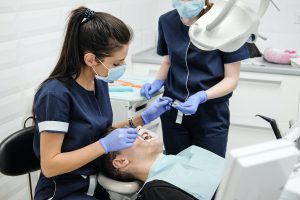
According to the World Health Organization, dental caries is the most common chronic disease in children. Despite this, dental health is often overlooked, both in terms of individual care and public health policy. This is a mistake, as poor dental health can lead to a host of other problems, both physical and mental. There are a number of things that you can do to improve your dental health.
First and foremost, you should brush your teeth at least twice a day, and floss at least once a day. This will help to remove plaque and bacteria from your teeth, and will also help to prevent cavities. Brushing twice a day also helps to freshen your breath. In addition, you should visit your dentist regularly for checkups and cleanings.
To brush your teeth effectively, use a pea-sized amount of toothpaste on your toothbrush. Aim the toothbrush at a 45-degree angle towards the gum line and use gentle circular motions. Be sure to brush on the inside surfaces of your teeth and to use a light back and forth motion on the chewing surfaces of your molars. Spit the toothpaste out after brushing.
It is also important to floss your teeth daily. Use about 18 inches of floss and wind most of it around your middle fingers, leaving about an inch of floss to work with. Hold the floss tightly between your thumbs and index fingers. Use a gentle rubbing motion to guide the floss between your teeth. When the floss reaches your gum line, curve it into a C shape against one tooth and slide it up and down under the gum line. Use a clean section of floss as you move from tooth to tooth. Spit the floss out after flossing.
You can also take steps to improve your diet. Eating foods that are high in sugar can contribute to tooth decay, so it is important to limit your intake of sugary snacks and drinks. In addition, you should make sure to include plenty of fruits and vegetables in your diet. These foods contain important nutrients that can help to keep your teeth and gums healthy.
You should quit smoking. Smoking is a major risk factor for gum disease, and it can also stain your teeth. If you are struggling to quit smoking, there are a number of resources available to help you, including nicotine replacement therapies and counseling.
You should try to reduce your stress levels. Stress can have a negative impact on your overall health, and it can also contribute to gum disease. If you are feeling stressed, there are a number of relaxation techniques that you can try, such as yoga or meditation.
Visit Your Dentist Regularly

You should make sure to visit your dentist if you have any concerns about your dental health. Your dentist can provide you with the necessary treatment and preventive care to keep your mouth healthy. Always tell your dentist about any medications you are taking because some medications can cause dry mouth. This can lead to tooth decay and gum disease. If you have any questions or concerns about your oral health, be sure to ask your dentist.
Always tell your dentist about any medications you are taking because some medications can cause dry mouth. This can lead to tooth decay and gum disease. If you have any questions or concerns about your oral health, be sure to ask your dentist.
If your dentist has recommended a mouthwash, use it. These formulations of mouthwash will help reduce the risk of gum disease and can also help eliminate bad breath. Be sure to follow the directions on the mouthwash you choose. Rinse your mouth out two times a day for best results. It is important to replace your toothbrush every three months. Over time, the bristles on your toothbrush become worn and stop performing as well. In addition, bacteria can build up on your toothbrush and become embedded in the bristles. Replacing your toothbrush frequently is a core component of a good dental care regimen.
Have your teeth cleaned and checked out twice a year by your dentist. Regular dental checkups can spot any developing problems with your teeth before they become serious. Going for regular cleanings is the best way to ensure that your teeth stay in good shape. You can save money and your teeth by getting treatment quickly.
Drink soda and non-water beverages with a straw. That helps them to avoid contact with your teeth. That will help keep your teeth from getting stained. You can get oversized straws to avoid making a mess. Limiting your sugar intake can prevent cavities and help keep your teeth healthy. It also helps to reduce your risk of cavities. When enjoying a sugary treat, you can reduce damage to your teeth by eating them with your meal; this will cause your saliva to flow and help prevent the stickiness from setting on your teeth.
If possible, you should even consider brushing your teeth after each and every meal. Do not hesitate to carry a small toothbrush with you so you can brush your teeth no matter where you are. If you do not brush your teeth after a meal, make up for it by spending more time brushing your teeth later. Do not forget to brush your tongue. There are many different types of bacteria that live on your tongue. Leaving this bacteria on your tongue can cause bad breath and it can collect on your teeth. Because of this, you should always brush your tongue whenever you brush your teeth.
Whitening strips and cleanings help to create whiter teeth. Read all directions carefully and do not leave whitening strips on teeth for too long. Your teeth can become sensitive or damaged if you use whitening strips too often. Expectant mothers should start taking good care of their teeth. Pregnancy can cause a number of problems with teeth, so be sure you get it all under control. Brush your teeth three times daily, and floss as much as you normally would. If you have any trouble, get in touch with a dentist right away. If you are going to be having anesthesia for a dental procedure, be sure to ask how you will be kept comfortable.
Here is a good video on caring for your dental health which you may want to check out.